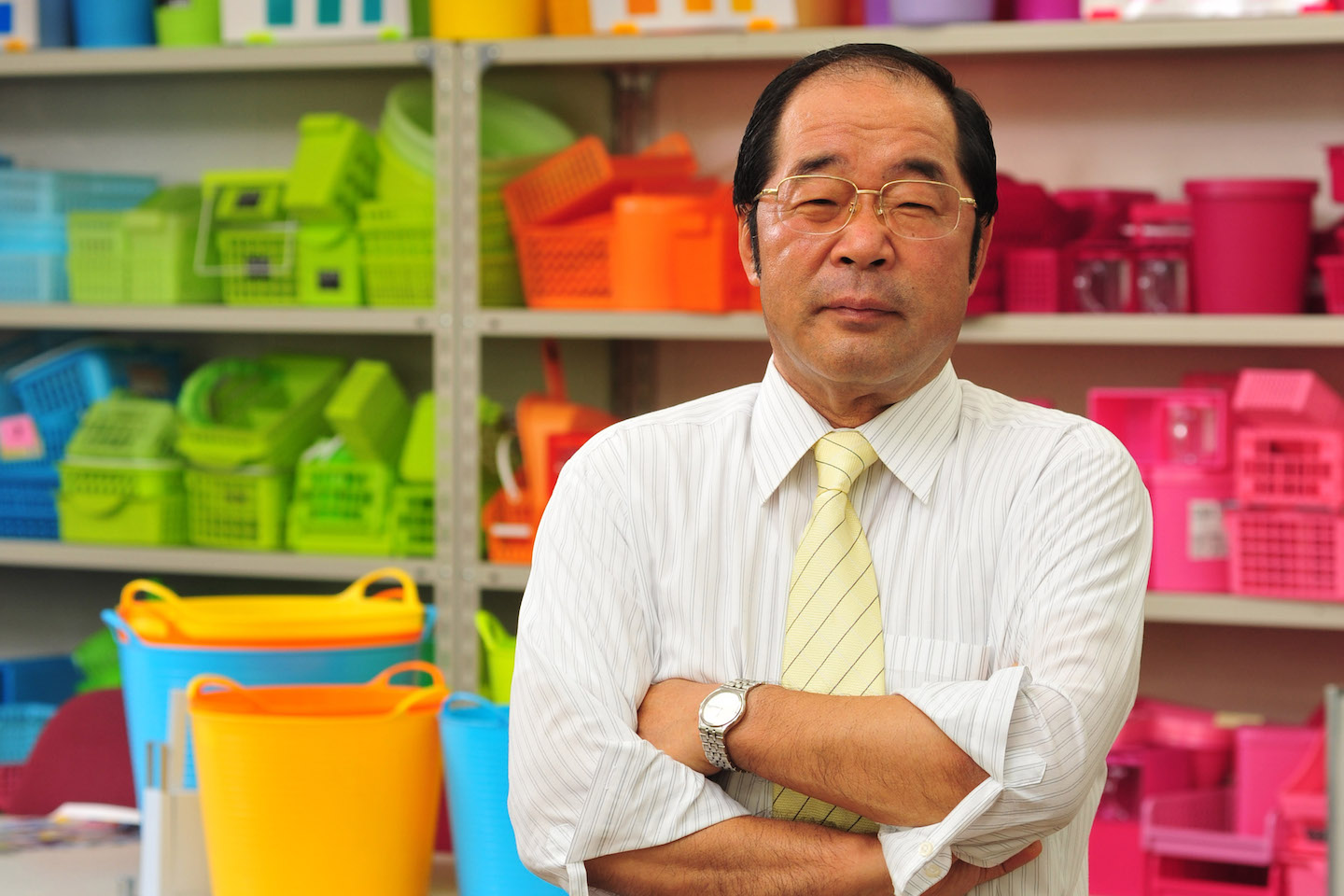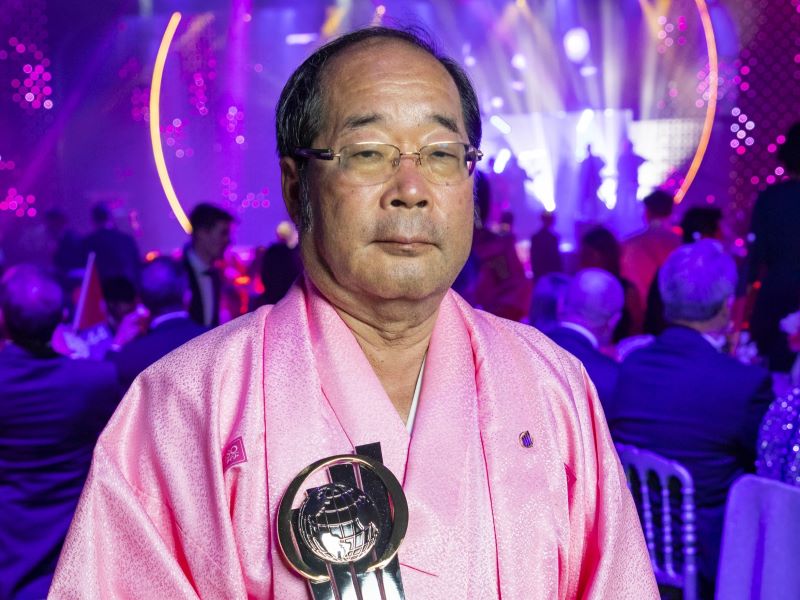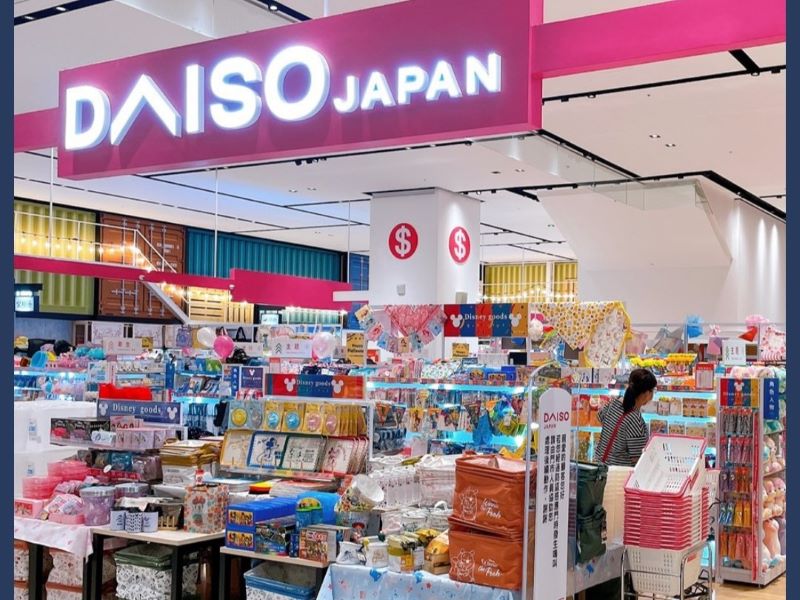
In 1977, Yano founded Daiso, which translates as “creating something big", and has since turned it in to a retail giant. (Photo: EY Entrepreneur of the Year Award)
The Japanese delegation approaches, a body of suits surrounding the man I recognise from prior research as Hirotake Yano. I extend my hand towards him but he shakes his head, points to a colleague and sits down at the table reserved for our interview. A laughing translator takes pity on me.
“He wanted to trick you by pretending that the young man is the company founder,” he says. As we take our seats, he continues with the quiet aside, “Let’s go easy because he’s not good at being serious.”
And that is how I met the founder of Daiso Industries, the multibillion-dollar retail franchise that is Japan’s answer to dollar stores.
The sharply dressed Yano is the antithesis of the sombre Japanese businessman stereotype. For one, never before has an interviewee pulled out colourful toys — a plastic beetle and centipede — from their pocket and thrown them across the table at me. “Icebreaker,” explains our interpreter succinctly. He exchanges a few words with Yano and then looks sheepishly at me again. “I’m sorry, he will need those back later.”
And just in case the ice is not sufficiently thawed, Yano holds up his index finger, pulls yet more paraphernalia out of his pocket à la Doraemon and executes a quick magic trick that leaves us laughing, mostly because he very obviously got a kick out of performing it.
The septuagenarian often has a literal trick up his sleeve, it turns out.
“That’s what makes me, me,” he says. “I love jokes, I am a joke.”
There is nothing funny about the empire he has built, however. Founded in 1977 as a humble discount store selling a multitude of items at a fixed ¥100, Daiso currently boasts over 5,000 outlets in 28 countries with a good third of them based in Japan. Its concept might be far from original, but the privately owned company distinguishes itself through relentless innovation and the surprisingly high quality of its own-brand goods. Daiso is said to create 700 new products a month, spanning categories such as household essentials, stationery, art and craft, electronics, hardware and health and beauty. It even has a dedicated Kawaii category that celebrates Japan’s culture of cuteness, expressed in twee, charming aesthetics.
The sheer variety of practical and novelty items (estimated to be between 70,000 and 100,000 products) transforms a dull hour of stocking up on essentials to an Alice-like discovery of material wonderland. Even though most labels and instructions are spelt out in Japanese script, language poses little barrier here. Arranged across high shelves that block the exit from view, in attractive displays and with surprise finds around every corner, are miracle sponges and detergents, vacuum seal bags for efficient luggage packing, phone accessories, patterned tenugui (towels), storage organisers in all colours and sizes, and a cornucopia of Japanese snacks and beverages. Perfecting its treasure hunt or discovery retail model is precisely how Daiso entices customers to walk in wanting a single item yet leave with numerous purchases they did not know they needed.
48026720362_7c4223c670_o.jpg

Selection differs from country to country with the fixed price converted to the respective currency (A$2.80 in Australia, or RM5 pre-tax in Malaysia), though more premium products with corresponding price tags have since been introduced. Clever curation and bargain prices are behind Daiso’s loyal following and healthy balance sheet — it saw a brisk US$4 billion in sales in 2018 — but credit also has to be given to its philosophies of reinvention and charity. Both can be directly traced to its founder, whose success was recognised at the 2019 EY World Entrepreneur Of the Year gala in Monaco.
“I did not have any aspirations or ambitions as a child,” says Yano. “I was very shy, not at all confi dent, and always wondered who I would be when I grew up. I think I just wanted to be a grown-up.”
Born in Beijing as the fifth of eight children, his family moved back to his father’s hometown in the Japanese prefecture of Hiroshima shortly after World War II. It was a time and place of desperate poverty and while his father would develop a reputation as an esteemed physician as the country rebuilt itself, Yano never forgot what it was like to go without.
“My parents had no expectations of me as a child,” he says. “We were just trying to survive right after the war. Everybody was starving; you would put into your mouth anything you could. That was Japan back then; nobody had a dream. I found my way through sheer luck. I am where I am because of my parents, my dad in particular. A hundred times a day, he would tell me to study hard, to work hard. That became something I could do; I could work hard. So I did.”
Researching this elusive gentleman proved tricky as he seems to have given few interviews, much less in English. Some articles describe him as a former fishmonger, which surprises him. “No,” he says in English, shaking his head and then engaging the interpreter in a flurry of conversation. “I would not call myself a fishmonger. There are many fake stories, I think. I’m not very familiar with the ocean. It’s nice being in a boat in fine weather but a terrible thing when the seas are rough.”
Rather, Yano married young and took over an aquaculture business, farming Japanese amberjack or yellowtail. It went bankrupt in 1967 and he found himself doing a moonlight fl it with his wife to escape creditors. A series of nine odd jobs followed, including working at a bowling alley and selling encyclopedias.
Yano finally struck upon a winning formula in 1972. Then 29, he started hawking assorted goods out of the back of his truck, reselling merchandise bought cheaply and wholesale from businesses looking to offload excess or non-moving stock. The one-man show, which he named Yano Shanto, would continue for five years as he handled inventory, transactions and setting and clearing up mobile displays. Yano decided on a uniform pricing of ¥100 for all goods to ease transactions, a largely unfamiliar concept in mid-1970s Japan. While standardising the price lowered his profit margins, it encouraged liberal consumer spending and transformed revenue building to a volume game.
Expansion beckoned and despite his reluctance to embark on a major project, the quiet entrepreneur gave in. His first ¥100 store was established and christened Daiso, which loosely translates to “creating something big”. Although he would confess to quickly regretting the name, it proved to be a self-fulfilling prophecy, growing into a global retail giant.
daiso_japan.jpg

“The name was accidental,” says Yano. “I thought it was good initially as we might be making something great. But then I was ashamed of it because it was associated with such a huge ambition, so I kept trying to find new names for it. I didn’t expect things to go the way they did. My ultimate goal was to make sure I had enough to eat every day. Even now. I still worry about not being able to afford to eat.
“My biggest mistake, my hardest struggle, was going bankrupt. Back then, bankruptcy equalled death for many people. I contemplated it too. You asked me what made me keep going. Nothing, really. I had no choice but to go on. There was simply no other option. I had a single goal: to put food on the table for my family. And I thought, whatever happens, happens. But I was very lucky. There was always someone who turned up to help in some way. I think the good things that my ancestors did came back to bless me. I think there is some luck that comes to you when you’re born, and some you have to acquire yourself. I had both.”
While his toughest challenges might have been blessings in disguise, in how they prepared him for what was to come, the genial founder acknowledges that it was more than just good fortune that saw him through difficult times. None of his eventual success would have been possible without his adaptability, perseverance and fortitude.
“A monk once told me that there is nothing wasteful about anyone’s life experiences,” he says. “I did many things that I thought were a waste, and none of them succeeded. I thought everything was going further downhill with each failure. But when I look back, everything that I thought had been a waste came with me for what happened next. All the work that I did, everything I engaged myself in, failed one after another but they each had a purpose and taught me something.
“I also work hard at every single thing. I worked hard to build trust with our customers, and they saw that hard work. I’m still building that trust today. It’s continuous. Trust is hard to build and easy to lose, so you have to keep earning it. And you cannot earn it overnight; you have to work at it. You can never stop working at it. None of this is easy. You want to build a business, you have to work every day. You want to make products, you have to work every day. You want to be my size, you have to eat every day,” he laughs.
And Yano definitely practises what he preaches. He is still actively involved in the running of Daiso and shows by example that no honest work is too menial or beneath him. In fact, he personally unloaded containers every morning until the age of 70. Although he has eased off the physical labour, innovation continues and improving the customer experience remains a priority.
“Some businesses slow down over time because they don’t resonate with customers, but I was never focused on becoming big or making a lot of profit,” he says. “The only thing I was concerned about was making customers happy. That is the ambition you need as a business in the 21st century. We are living at the tipping point of business behaviour, where you have to do good as a business, and not just provide goods, to survive. We became successful by finding items that were scarce or inaccessible and making them widely available and affordable. But we live in a different world now than the one we did when Daiso was founded. We live in a time of abundance, where access to most things is easily available, so consumers are looking for businesses that are relevant or whose values resonate with them. You have to give back to customers and communities. I like that, that I can now donate things and help others.”
Yano suddenly seems self-conscious and asks, “Why are you interested in me?”
“You have an interesting story and a good sense of style,” I reply.
“I agree with you,” he nods.
“You’re not what I expected,” I say. “I thought the founder of such a renowned retail franchise would be very serious.”
“I’m always mischievous and looking for fun,” laughs Yano. “But most of the time, I had no idea what I was doing. I just took any opportunity that came along. I was not talented enough to have a dream. A tabloid magazine in Japan described me as the non-confident president. Even though I am where I am today, a lack of confidence is something you carry with you, it doesn’t leave you. But it’s also a power for me. It reminds me to be careful about the future. That’s good because I don’t take anything for granted.”
This article first appeared on June 8, 2020 in The Edge Malaysia.


